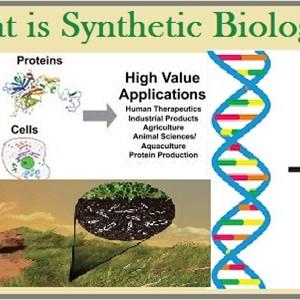Synthetic Biology Market 2035: Transforming Industries with Next-Gen Bioengineering

The global synthetic biology market is on a transformative growth trajectory, driven by rapid advancements in genetic engineering, automation, and computational biology. Valued at US$ 18.9 billion in 2024, the market is expected to expand at a compound annual growth rate (CAGR) of 14.1% between 2025 and 2035, ultimately reaching US$ 84.7 billion by 2035. Synthetic biology represents the convergence of biology, technology, and engineering to design and construct new biological parts, devices, and systems for useful purposes. Over the past decade, the field has moved beyond the research phase into real-world applications across healthcare, energy, agriculture, food, and environmental sectors. Key players such as Ginkgo Bioworks, Bolt Threads, Mammoth Biosciences, LanzaTech, Motif FoodWorks, Joyn Bio, Kiverdi, Perfect Day, Viridos, Upside Foods, Asimov, Apeel, and Twist Bioscience are leading the charge in commercializing innovations that are redefining industries and sustainability models.
Growth Drivers
A combination of technological innovation, environmental urgency, and growing industrial demand underpins the market’s expansion. The plummeting cost of DNA sequencing and synthesis has made it possible to manipulate genetic materials at unprecedented speed and precision. This accessibility has spurred innovation across diverse industries. In healthcare, synthetic biology enables the development of personalized medicine, gene therapies, and biosensors for rapid diagnostics. In the food industry, companies like Perfect Day and Upside Foods are pioneering animal-free dairy and lab-grown meat, addressing global sustainability concerns and ethical issues surrounding animal agriculture. Moreover, biofuel and bioplastic production using engineered microorganisms by companies such as LanzaTech and Kiverdi is helping reduce reliance on fossil fuels. The rise of automation, AI-driven biological design, and cloud-based biofoundries is also propelling scalability and speed, further driving adoption.
Another major growth catalyst is the global push toward sustainable and circular bioeconomy initiatives. Governments and private investors are pouring funds into research and commercialization efforts aimed at reducing carbon footprints and fostering environmentally friendly production systems. This combination of scientific advancement and policy support is setting the stage for exponential growth in synthetic biology applications.
Report Scope
The Synthetic Biology Market Outlook 2035 provides an in-depth analysis of industry trends, growth drivers, challenges, and future opportunities. The report examines key segments by technology, application, and end-user, offering quantitative insights into market performance across various regions. It also assesses the competitive landscape, highlighting strategic developments such as mergers, partnerships, and product innovations among leading players. The study’s time frame from 2025 to 2035 enables stakeholders to understand both short-term fluctuations and long-term growth prospects. Additionally, the report evaluates the impact of global sustainability trends, advances in AI and automation, and evolving regulatory frameworks on the future of synthetic biology.
Segmentation
The synthetic biology market is broadly segmented based on technology, application, and end-use industry.
By Technology:
Key technological categories include gene synthesis, genome engineering, bioinformatics, and cloning technologies. The gene synthesis segment holds a dominant share, fueled by reduced synthesis costs and its wide utility in pharmaceutical and industrial biotechnology research. Genome engineering, powered by CRISPR and advanced editing platforms, is anticipated to witness the fastest growth due to its applications in therapeutics and agriculture.
By Application:
The market serves diverse applications such as healthcare and pharmaceuticals, agriculture, industrial biotechnology, environmental applications, and food & beverages. Healthcare remains the largest segment, driven by innovations in synthetic vaccines, gene therapies, and diagnostic biosensors. Meanwhile, agricultural biotechnology is growing rapidly as synthetic biology is used to create pest-resistant crops and sustainable biofertilizers.
By End-Use Industry:
The end-user landscape includes biotechnology firms, academic institutions, pharmaceutical companies, and food tech enterprises. The food and agriculture sectors, in particular, are witnessing accelerating adoption as synthetic biology becomes central to alternative protein and sustainable food production.
Regional Analysis
Geographically, North America leads the global synthetic biology market, owing to its advanced research infrastructure, robust venture capital ecosystem, and the presence of major players like Ginkgo Bioworks and Twist Bioscience. The United States remains the largest contributor, supported by substantial funding from government agencies and private investors. Europe follows closely, driven by sustainability-focused policies, academic excellence, and companies like Bolt Threads and Apeel pioneering eco-friendly biomaterials.
In Asia-Pacific, the market is witnessing rapid expansion, fueled by increasing biotechnology investments in China, Singapore, Japan, and South Korea. These countries are focusing on synthetic biology to strengthen food security and energy sustainability. Latin America and the Middle East & Africa are emerging markets, with growing interest in bio-based materials and clean energy initiatives. Regional collaborations, government incentives, and cross-border R&D partnerships are likely to further enhance global market integration and innovation over the next decade.
Competitive Analysis
The competitive landscape of the synthetic biology market is characterized by a dynamic mix of established biotech giants, innovative startups, and strategic partnerships. Leading players such as Ginkgo Bioworks and Twist Bioscience dominate through their scalable DNA synthesis platforms and biofoundry capabilities. Bolt Threads and Perfect Day have emerged as leaders in sustainable biomaterials and alternative proteins, while LanzaTech and Viridos are redefining clean energy with biofuel innovations. Mammoth Biosciences and Asimov are advancing the healthcare frontier through precision diagnostics and biodesign automation, respectively.
- Art
- Causes
- Crafts
- Dance
- Drinks
- Film
- Fitness
- Food
- الألعاب
- Gardening
- Health
- الرئيسية
- Literature
- Music
- Networking
- أخرى
- Party
- Religion
- Shopping
- Sports
- Theater
- Wellness


